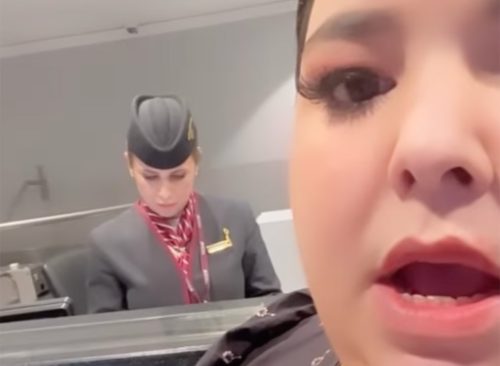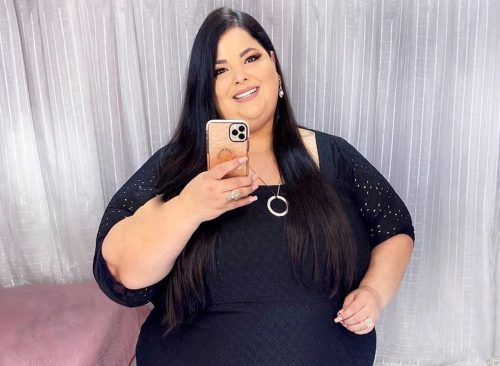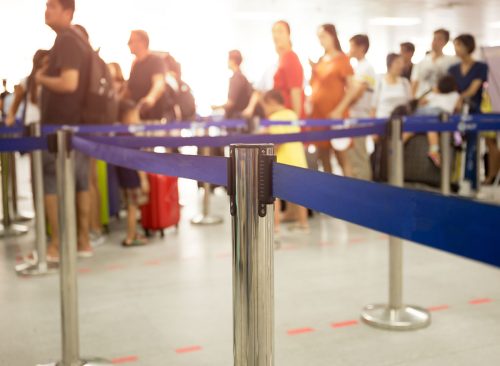Plus-Sized Model Was “Stopped From Boarding Because She Was Too Big for Her Seat.” Now Court Orders Airline to Pay for Psychotherapy For Her.
“They don’t want me to board because I’m too fat,” she said.

No, it’s not just your imagination: Airplane seats have gotten smaller since the 1990s. According to FlyersRights the average seat has shrunken from 18 inches to about 16 inches, and the distance between seat backs has decreased from 35 inches to sometimes less than 28 inches. While smaller seats equates to greater discomfort for the masses, it has become extremely problematic for those who are on the larger side. In recent years there has been a lot of attention drawn to the discriminatory nature of smaller seats, as some people feel pressured to pay more for business or first class to accommodate their needs. Recently, a plus-sized model was even stopped from boarding her seat on an international flight after being told by the airline that she was “too fat” to fly coach.

On November 22, influencer Juliana Nehme, 38, attempted to board a Qatar Airlines flight from Beirut to Doha. However, she was told by the airline that either she needed to upgrade her seat or get off the flight entirely. She went on to tell her 167,000 Instagram followers about the incident and the post has gone viral.

Juliana, who lives in Brazil, was vacationing in Lebanon. She flew to the country via Air France with zero problems. However, when she attempted to fly home to Sao Paulo via Doha, she was informed by a staff member that she would have to shell out for a first-class ticket – costing upwards of $3,000 – to accommodate her bigger size. When she asked to be refunded the $1,000 she paid for the seat, the airline refused.

“They are denying my right to travel … I’m desperate, help me, they don’t want me to board because I’m fat,” she said during the video. “What a shame for a company like Qatar to allow this type of discrimination against people! I’m fat, but I’m just like everyone else!” Her sister and nephew ended up taking the flight back home, while she and her mother stayed in Lebanon. Eventually, the Brazilian ambassador called Qatar Airlines, who eventually arranged for her to fly back on the 25th without having to pay extra money.

On December 20, a Sao Paulo court ordered Qatar Airways to pay for Juliana’s psychotherapy to treat the trauma she experienced as a result of the incident. Her treatment must involve “a weekly therapy session worth $78 for a period of at least one year, totaling $3718 to be deposited in the plaintiff’s bank account.” Judge Carvalho explained that the “granting of urgent relief is a reasonable and proportionate measure to ensure that the stressful and traumatic event is overcome” by Juliana with her lawyer, Eduardo Barbosa, described the ruling as “a milestone in the fight against prejudice.”

“It was like I wasn’t a human being to them. I was a fat monster that couldn’t get on board. It was horrible. I’d never imagined going through something like this, ever,” Juliana told the media. “It hurts me now to remember how much I blamed myself because I blamed myself a lot, I even asked my mother for forgiveness several times. I said, ‘Mum, forgive me because me being like this stopped you from going home.’ And she said it wasn’t my fault.”

“Qatar Airways treats all passengers with respect and dignity and in line with industry practices and similar to most airlines, anyone who impedes upon the space of a fellow traveler and cannot secure their seatbelt or lower their armrests may be required to purchase an additional seat both as a safety precaution and for the comfort and safety of all passengers,” the airline said in a statement.

“The passenger in question at Beirut Airport was initially extremely rude and aggressive to check-in staff when one of her traveling party did not produce required PCR documentation for entry to Brazil,” the statement continued. “As a result, airport security was requested to intervene as staff and passengers were extremely concerned with her behavior.”














